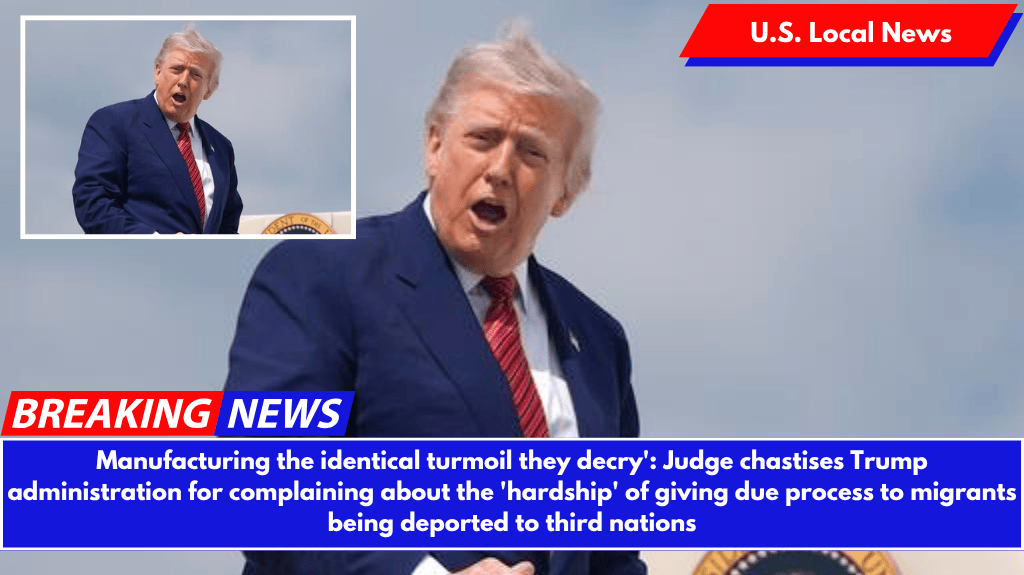A federal judge in Massachusetts will not overturn a decision last week that found the Trump administration violated a preliminary injunction by summarily removing six migrants to war-torn South Sudan — a country from which none of the migrants are citizens — without due process or a reasonable opportunity for them to express concerns about persecution or torture.
U.S. District Judge Brian E. Murphy, who has previously stated that the violation could amount to criminal contempt of court, chastised the administration on Monday for misrepresenting both the court’s previous order and the positions taken by Department of Justice attorneys during the proceedings.
“Defendants have mischaracterized this Court’s order, while at the same time manufacturing the very chaos they decry,” Murphy wrote in the 17-page order. “By racing to get six class members onto a plane to unstable South Sudan, clearly in breach of the law and this Court’s order, Defendants gave this Court no choice but to find that they were in violation of the Preliminary Injunction.”
Murphy issued a preliminary injunction last month prohibiting the government from sending migrants to third countries without first giving them a “reasonable opportunity” to express their concerns about the country and the potential for violence under the Convention Against Torture (CAT).
Last week, he convened an emergency hearing after the administration deported six migrants to South Sudan with less than 16 hours’ notice, “most of which were non-waking hours, none within the business day.” Following their removal, the detainees had virtually no means of communication.
During the emergency hearing, the DOJ claimed that administration officials misinterpreted Murphy’s injunction because he did not specify what a “reasonable opportunity” to express fear entails.
The court ordered the administration to keep the detainees on the plane in South Sudan until they received reasonable fear interviews.
The court also mandated that detainees have at least 10 days to file fear-based claims under the CAT before being removed to third countries. At the DOJ’s request, Murphy allowed the government to “keep the individuals out of the country and finish their process abroad.”
The Justice Department responded, claiming that the court’s order was “extraordinary” and imposed “highly burdensome requirements” on the government to keep the “dangerous criminals” detained in a “sensitive location” without “clear knowledge of when, how, or where this Court will tolerate their release.”
The DOJ also claimed that Murphy’s order imposed “impermissible” restrictions on President Donald Trump’s ability to exercise his Article II powers, which include “his powers to command the military, manage relations with foreign nations, and execute our nation’s immigration authorities.”
“The Court’s Orders are premised on an erroneous conclusion that Defendants failed to provide ‘meaningful opportunity’ for six class members to assert a claim for protection under CAT, despite having allowed the six class members an opportunity that is eminently reasonable in the removal context,” the DOJ wrote in the motion seeking reconsideration or a stay pending appeal.
“Furthermore, the Orders violate the President’s inherent Article II authority to conduct foreign affairs and serve as Commander-in-Chief. The Orders also improperly interfere with the President’s ability to faithfully carry out immigration laws.”
However, the government’s complaints went unheard, as Murphy explained that his order never required the government to conduct their proceedings overseas, writing that the administration could “simply return to the status quo of roughly one week ago” by returning the migrants to the United States or choose “any other location to complete the required process.”
“It cannot be said enough that this is the result Defendants asked for,” Murphy had written. “In doing so, the Court provided Defendants with a method of compliance that guaranteed the procedural rights due to class members while being less demanding than having to turn around a chartered plane.
The Court considered the defendants’ prerogative in the sensitive and political areas of immigration and foreign policy, and granted them complete discretion to conduct these interviews at their leisure.”
The judge went on to criticize the administration for complaining about the “hardship” of having to conduct “impromptu immigration proceedings on foreign soil,” saying “that was — and continues to be — Defendants’ daily choice,” and adding, “To say more would be to paint the lily.”











